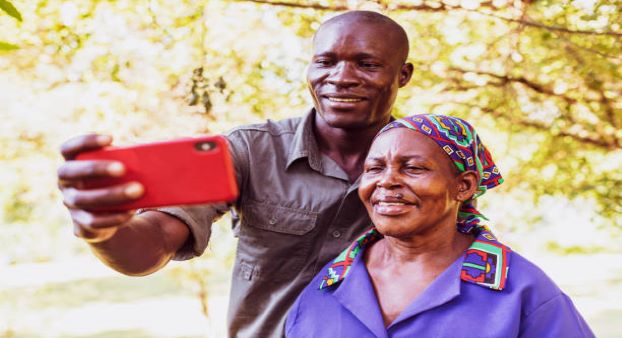Telecom
GSMA Urges Closing the Mobile ‘Usage Gap’ to Achieve Sustainable Development Goals

Closing the mobile internet ‘usage gap’ should be a priority for countries seeking to deliver against the ambitious UN Sustainable Development Goals, according to the GSMA’s seventh annual Mobile Industry Impact Report: Sustainable Development Goals.

The report shows that, six years after becoming the first industry to commit to the SDGs, the mobile sector continues to increase its contribution to the achievement of all 17 goals. However, despite mobile operators’ continued commitment to the 2030 agenda, there is still a long way to go.
A combination of global conflict, growing food and energy poverty, economic uncertainty, and the ongoing impacts of Covid-19 are creating significant headwinds, currently threatening SDG progress worldwide. In the face of these challenges, the report highlights the crucial role mobile connectivity and connected technologies can play as enablers, supporting countries as they ‘build forward better’ in pursuit of economic recovery and resilience.
In many countries, particularly low- to middle-income nations, mobile is the principal way to access the internet. Mobile operators’ investments in network infrastructure have helped to shrink the ‘coverage gap’ for mobile broadband networks from 1.4 billion people in 2015 to 400 million people in 2022, contributing strongly to a range of SDG indicators.
However, around 3.2 billion people who are covered by networks are still unable to reap the benefits of this connectivity, due to lack of skills, knowledge, affordability, relevant content and other factors. This ‘usage gap’ is fast emerging as one of the biggest ‘brakes’ on economic and social progress globally.
The report demonstrates how people with access to fast, reliable networks are able to stay connected to friends and family, work remotely, access education and health services, build innovative businesses, improve efficiencies and reduce carbon emissions.
“Those without access, in contrast, are most vulnerable to economic and social disruption, and risk falling further behind as the world emerges from the pandemic, especially as online services become even more integral to society.
Jose-Maria Alvarez Pallete, CEO of Telefonica and GSMA Chairman said: “In a world where conflict, food insecurity and economic uncertainty are at the top of the global agenda, mobile has never had a more important role to play.
“The GSMA’s SDG Impact Report demonstrates the transformational impact of communications in tackling these enormous challenges, acting as a catalyst for positive change and delivering meaningful progress.”
Mats Granryd, GSMA Director General, said: “The UN General Assembly in New York this week is a powerful reminder of the importance of collective action in the face of growing global challenges. The SDGs remain a guiding compass for global progress, and the mobile industry is proud to be both an advocate for them, and a crucial enabler of their delivery.
“Mobile connectivity and digital inclusion are essential tools to achieve the ambitious goals laid out in the 2030 Agenda and help the world face into the headwinds of global inequality, poverty and conflict.
“We urge policymakers to address the barriers that constrain private sector investment in high-quality mobile networks and to join in helping close the ‘usage gap’ that holds back so many from living up to their potential in our increasingly connected world.
“Together, we can harness the power of connectivity as a catalyst for economic recovery, social progress, and digital inclusion, improving the lives of millions worldwide.”
The mobile industry’s SDG contributions
The mobile industry increased its impact on all 17 SDGs in 2021, with the average year-on-year increase accelerating compared with 2020. The average SDG impact score across the 17 SDGs reached 53, up from 49 in 2020 and 32 in 2015, meaning the mobile industry is achieving 53% of what it could potentially contribute to the SDGs. Other highlights include:
– There are now eleven SDGs where mobile’s contribution is over 50, compared to six in 2020 and none in 2015.
– The mobile industry continues to achieve its highest impact on SDG 9: Industry, Innovation and Infrastructure, driven by the reach of mobile networks and take-up of mobile internet services.
– The biggest improvements were recorded in the industry’s contribution to SDG 1: No Poverty, SDG 2: Zero Hunger and SDG 4: Quality Education. This is due to the increasing proportion of people using mobile for life-enhancing activities such as accessing government services, applying and searching for jobs and obtaining educational information for themselves or their children.
Telecom
Mart Networks Rolls Out Tailored Cybersecurity Solution for Fintechs

Mart Networks, a leading cybersecurity distributor across Africa and the Middle East, has unveiled a specialized cybersecurity package tailored for fintech firms.

The solution, powered by Invinsense, Infopercept’s unified cybersecurity platform, aims to address the growing security needs of fintechs operating in highly regulated environments.
According to Moiz Maloo, Managing Director at Mart Networks, fintech companies face unique security challenges due to stringent regulatory requirements and increasing threats. “Most fintechs don’t have the luxury of multiple internal security teams or system integrators. With this focused offering, we’re providing an all-in-one platform with managed services built specifically for the fintech environment,” he said.
The offering integrates four key components: Invinsense XDR and Managed Detection & Response for real-time monitoring, Exposure Management for vulnerability detection, Security Compliance Management to support fintechs in meeting regulatory standards, and Cybersecurity Awareness Programs to empower teams against cyber threats.
Furthermore, the package includes deep application visibility, ensuring fintech-specific applications remain secure through Invinsense SIEM’s custom log ingestion capabilities. To reinforce protection, Infopercept’s engineering team will provide code-level fixes, patches, and infrastructure security enhancements.
With the rise of cloud-based fintech operations, the solution also incorporates full-stack cloud security, including API security, Cloud Infrastructure Entitlement Management (CIEM), and Application Security Posture Management (ASPM).
Mart Networks’ move underscores the growing importance of cybersecurity in Africa’s fintech sector, as financial services become increasingly digital and susceptible to evolving cyber threats.
Telecom
Equinix Expands Digital Footprint in Nigeria with Launch of LG2.3 Data Center

Equinix, Inc. the world’s digital infrastructure company™, has officially opened its latest data center expansion in Lagos. Called LG2.3, the facility will support Nigeria’s growing digital transformation efforts, providing state-of-the-art colocation and secure interconnection solutions which will empower businesses across the region.

It also signifies Equinix’s unwavering dedication to advancing Nigeria’s position in the global digital economy, reinforcing the company’s commitment to the region.
As part of the inauguration, Bruce Owen, President of EMEA at Equinix, along with other Equinix executives, led the ribbon-cutting ceremony at the newly expanded site. In addition to an official visit to the Governor of Lagos State, Equinix hosted an exclusive customer engagement event, bringing together key customers and partners from Nigeria’s business and technology sectors.
Attendees discussed shared successes and Equinix’s role in facilitating digital transformation, while also connecting directly with Bruce Owen for insights into how Equinix’s solutions drive innovation and business agility in the region.
Equinix executives also took part in a tree-planting ceremony, symbolising Equinix’s continued investment in sustainable initiatives across the globe and highlighting the company’s broader goal of reducing its carbon footprint while supporting greener practices across its operations worldwide.
Speaking about the expansion, Bruce Owen, President of EMEA at Equinix said “Nigeria is a crucial market for Equinix. Today’s opening is a clear demonstration of our continued commitments to invest and grow digital infrastructure that will benefit the many thousands of businesses in Nigeria and on the continent as a whole.
“I am deeply encouraged by the enthusiastic partnerships and innovations emerging from this dynamic region, which continue to inspire our commitment to Nigeria’s digital and sustainable future.”
Adding to this, Wole Abu, Managing Director of Equinix West Africa, highlighted the critical role of data centers in driving economic growth stating “Data centers continue to play a pivotal role in driving economic development in Nigeria, serving as critical infrastructure that supports digital transformation and economic growth.
“As governments and enterprises increasingly acknowledge their significance, global demand for data center capacity is poised to rise. While Africa’s demand for data solutions is still evolving compared to more mature markets, the continent is demonstrating strong potential for digital adoption and innovation.
“To meet this growing need, Equinix is actively advancing three major data center projects in Nigeria, with future expansion plans for Ghana, Côte d’Ivoire, and South Africa.”
Equinix remains steadfast in its mission to enable secure, scalable, and sustainable digital growth for economies across the world.
Telecom
African Women Hit Hardest as Mobile Internet Gender Gap Persists

African women remain among the most digitally excluded globally, with smartphone affordability and digital literacy among the key barriers. New data from the 2025 GSMA Mobile Gender Gap Report, launched recently, reveals a persistent global gender gap in mobile internet use across low- and middle-income countries (LMICs).

It further notes that literacy, digital skills, safety, and affordability of data also remain critical barriers. The report highlights that 885 million women across these regions still do not use mobile internet, with nearly 60% of them living in Sub-Saharan Africa and South Asia.
While mobile internet is the primary way women in LMICs access the internet, offering critical lifelines to health, education, and financial services, the pace of female adoption has stalled, leaving 235 million fewer women than men connected.
Claire Sibthorpe, head of digital inclusion at GSMA, highlighted that the gender gap had narrowed significantly between 2017 and 2020, but progress flatlined in recent years.
Although 2023 brought a slight improvement, restoring the gap to 15%, 2024 saw minimal change, with the gap settling at 14%.
The disparity is most severe in Sub-Saharan Africa, where women are 29% less likely than men to use mobile internet.
“It’s disheartening that progress in reducing the mobile internet gender gap has stalled. The digital divide is driven by deep-rooted socio-economic and cultural factors that disproportionately impact women,” said Sibthorpe.
GSMA projects that closing the gender gap by 2030 could add $1.3 trillion to GDP across LMICs and deliver $230 billion in revenue to the mobile industry.
The report, funded by the UK FCDO, Sida, and the Gates Foundation, stresses the urgent need for targeted investment and policy action to bridge the digital divide and ensure that no woman is left offline.
“The mobile internet gender gap is not going to close on its own. It is driven by deep-rooted social, economic, and cultural factors that disproportionately impact women,” said Sibthorpe.

 E-Financial1 day ago
E-Financial1 day agoAccess Holdings Sets Benchmark in Fraud Prevention With ₦193.5Bn Tech Investment

 E-Financial1 day ago
E-Financial1 day agoMTN’s Digital Lending Arm Disburses $592m Loans in Q1

 E-Financial1 day ago
E-Financial1 day agoAccess Bank, Deloitte Partner to Equip SMEs with Tools for Growth

 News1 day ago
News1 day agoSERAP Asks Ojulari, NNPC CEO to Account for Missing N500Bn or Face Legal Action

 E-Financial1 day ago
E-Financial1 day agoFG Verifies 2m Households for Cash Transfer

 E-Business1 day ago
E-Business1 day agoFG Launches Online Citizenship, Business Management Platform

 General News1 day ago
General News1 day agoNOTAP Urges South Eastern Entrepreneurs to Embrace Franchising as Business Model

 General News1 day ago
General News1 day agoFG Launches Online Citizenship, Business Management Portal to Enhance Transparency, Service Delivery




























